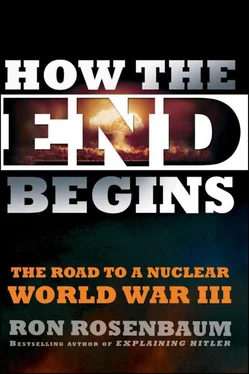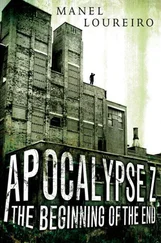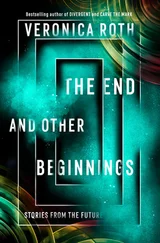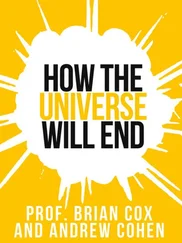Are there are other “no-go” periods in history peremptorily off-limits to those who want to put the current situation in perspective? Do we banish the history of slavery from our minds when discussing affirmative action? The Supreme Court just reaffirmed the Voting Rights Act, which makes certain that areas that exhibited racist behavior in the past are subject to special inspections. [225]This accords history a place in the conduct of current affairs.
In many ways, Holocaust inconsequentialism is worse than Holocaust denial, because inconsequentialism doesn’t deny it happened; it acknowledges the mass murder but adds insult to injury by depriving those murdered lives of any possible meaning for the living. Actually, the wish to “banish” it is not even second Holocaust denial: it’s a call for erasure of the first Holocaust, for elimination. The Final Solution to the Final Solution: forget it, eradicate it for all practical purposes.
Why the irrational fear of according Hitler’s Holocaust a place in historically based deliberations? If you ask me I think it’s because it’s an unbearable reminder of the shamefulness of human conduct. This willed memory erasure stems from an all too intense fear that it’s going to happen again and there’s no way to prevent it, so better to delegitimize or abolish recognition of the relevance of the original unbearable truth. In the end, the Holocaust is sacralized out of history by some, shamed out of history by others.
In America in particular, to speak of a second Holocaust as a serious possibility contravenes one of our most cherished beliefs: there is a solution to every problem, even the Middle East. Perhaps it is the absence of a tragic sense of history here, and perhaps also the absence of daily death threats. The idea of a second Holocaust has disturbed some American Jews such as New Republic literary editor Leon Wieseltier, who called concern about a second Holocaust “ethnic panic,” evidently too tribal for his lofty literary universalism. [226]
I suppose I can understand they are not eager to have their comfortable American assimilation disrupted by association with victimhood halfway around the world. No ghetto mentality here! There is also a superstitious reluctance by these second Holocaust deniers to utter it—as if, like a voodoo spell, speaking it aloud would bring it to life, and with it, a monumental golem of grief. Unfortunately such obtuseness feeds into the Israeli perception that they have no friends in the West willing to speak of the kind of peril they face—all the more reason to go it alone in the case of ambiguity of warning.
Compare this Holocaust inconsequentialism with the resurgence of flat-out Holocaust denial exemplified in the 2006 Tehran Holocaust deniers conference. [227]It was an important event because it demonstrated how Holocaust denial—once the province of a few crackpots—has morphed into an instrument, a central strategic rationale, for those who want to perpetrate one “for real.” Delegitimizing Israel’s existence by making it seem the product of a “Jewish trick”—inventing a Holocaust to guilt-trip the world into letting them take over in Palestine. But Holocaust inconsequentialism is worse because it doesn’t wear its anti-Semitism on its sleeve. Because all too many who wouldn’t go within miles of a Holocaust denier share a negationism with the Holocaust inconsequentialists on this issue. A negation of consequences, most saliently nuclear war.
To understand how deep emotion might determine our nuclear future, consider the words of Louisiana State University professor David Perlmutter in an op ed piece in the Los Angeles Times that goes so far as to justify a Samson Option type response. [228]
“What would serve the Jew-hating world better,” Perlmutter asks, “in repayment for thousands of years of massacres but a Nuclear Winter? Or invite all those tut-tutting European statesmen and peace activists to join us in the ovens? For the first time in history, a people facing extermination while the world either cackles or looks away—unlike the Armenians, Tibetans, World War II European Jews or Rwandans—have the power to destroy the world. The ultimate justice?”
Justice or vengeance? Or just pure rage at the world’s unconcern about incitement to genocide. It may be wrong, not proportional. But it’s there, that emotion. What role should emotion play in nuclear decisions? Isn’t the entire deterrent system designed to be based on an emotional dynamic, that of fear? Fear of attack leads to threatening a more fearsome retaliation that is designed to inspire fear of attacking in the first place.
What is the moral status of such retaliation? A friend familiar with the faculty of New York’s Jewish Theological Seminary offered to put me in contact with three of the sages there most familiar with such difficult ethical questions such as justice and retaliation and the history of Jewish thinking on the question.
I asked them, separately, to put themselves in the place of a Jewish submarine commander who learns of a nuclear Holocaust in Israel, and, cut off from his home base chain of command by the destruction of land-based communications links, must decide for himself what is the just response. What, in effect, would the sages’ Letter of Last Resort say?
The results played out almost as in some biblical story, or perhaps as if I were the wicked son asking the wicked question at the Passover feast. First one sage, then a second, pronounced himself unwilling to confront the question. Almost as if it were an affront to have been asked. One just wouldn’t comment, the other claimed a lack of expertise. I hate to say it, but I had a feeling they were afraid to commit themselves. These are literally explosive issues. Better to stay in their safe tenured little patch of academia than risk saying something on urgent but controversial questions where their purported wisdom might help ordinary people wrestle with huge life-or-death decisions. Academic timidity, don’t get me started. These are the ethics of genocide and you have nothing to say?
The third sage at least left me with a memorable phrase that I felt justified the quest. When I asked him my forbidden question about the morality of retaliation, particularly in the event of second Holocaust in Israel, he said, “You’re asking something new under the sun.” [229]
“Something new under the sun.” He understood! These are not questions that have had to be asked before the nuclear age. Perhaps the principles applied are older but the alternatives, genocide on each side of the question—this is “something new under the sun.”
And so you’re left with me to think about it and to ask you to think about it. One thing I want to think about is the possibility of nonretaliation. No striking back. Not necessarily to advocate it, but to describe my encounter with an advocate of it.
One of the saddest, most provocative things I’ve heard about the history of the Jews is the notion that while Christians preach turning the other cheek Jews are the ones who, through history, have actually done it. Berel Lang, one of the few scholars unafraid to face such questions, wrote an essay for a Jewish quarterly that he called “Why No Retaliation?” for Hitler’s Holocaust. [230]Some Jews did attempt postwar to poison a few German POWs, a haphazard scheme that didn’t result in many deaths. [231]There were virtually no Jews left in Europe to do any retaliating, and even those who tried to return to their old homes and might have been in a position to do so were forced to flee again by pogroms throughout Eastern Europe.
So it was more by default, not really by choice, that there was no retaliation. There was justice of a limited sort, the Nazi hunting of Simon Wiesenthal for instance. But no retaliation, just memory.
Читать дальше











